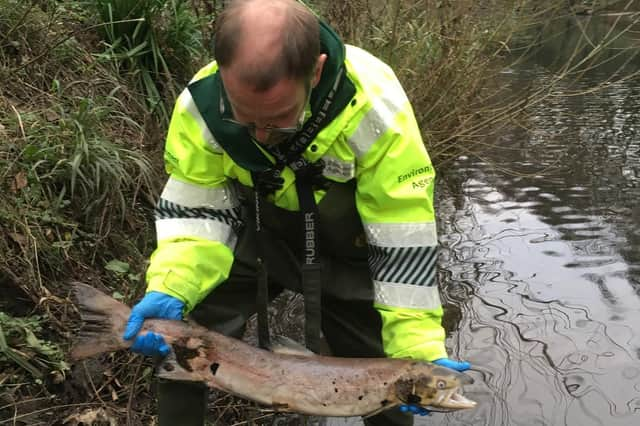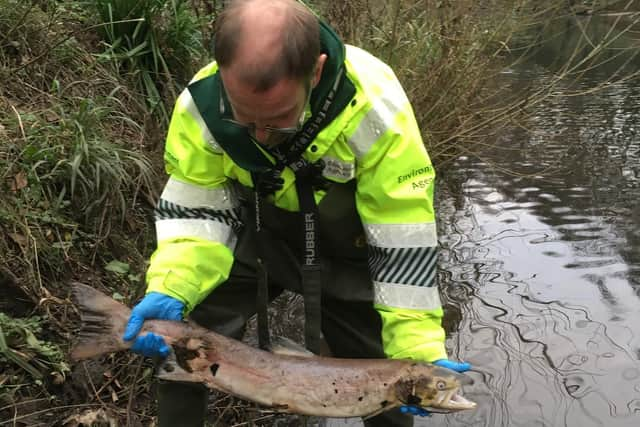Salmon found in the River Don in Sheffield


The body of the 79cm salmon was reported to the Environment Agency by a member of the public on Wednesday, January 2.
The river once teemed with the fish until weirs built to power the mills springing up along the Don began blocking their path during the industrial revolution of the late 18th and early 19th centuries.


Advertisement
Hide AdAdvertisement
Hide AdFactories spewing out pollution then made the river too dirty to support salmon, before environmental regulations introduced in the 1970s led to a dramatic improvement in water quality.Â
The Don Catchment Rivers Trust (DCRT) has been working with organisations including the Environment Agency, the Canal & River Trust, Sheffield City Council and Yorkshire Water to build the passes and improve the habitat so salmon can return.
It spent around £550,000 building five passes as part of its £1.4 million Living Heritage of the Rover Don project, bankrolled by the Heritage Lottery Fund.
And now, following the Environment Agency's recent push to improve water quality and introduce more fish passes to facilitate the migration of our native fish, the re-colonisation of salmon in the Don is now becoming a reality.
Advertisement
Hide AdAdvertisement
Hide AdJerome Masters, Environment Agency fisheries technical specialist, said: 'Although this individual reached the centre of Sheffield, the final two fish passes are still needed in order to re-establish a spawning population.
'Adult salmon do not feed when they enter rivers from the sea and so have only the energy reserves stored in their body to with which to propel them upstream and enable them to spawn successfully.
'Salmon only leap when they have to and prefer to swim past obstructions when they have the option. Leaping risks injury and as many attempts are often needed '˜drains the fish's batteries' before they reach their spawning grounds.'
Examination by Environment Agency fisheries specialists confirmed the female fish had recently spawned.
Advertisement
Hide AdAdvertisement
Hide AdThe agency said salmon often die after spawning and there was no reason to suspect anything other than a natural cause of death.
Prior to spawning, the fish probably weighed between 10 to 12 lbs (4.5 to 5.5 kg), it added.
Ben Gillespie, Yorkshire Water's lead environmental advisor said 'The confirmation of salmon in Sheffield demonstrates our investment in fish passes on the Don is working. These projects have been delivered in partnership with the Environment Agency and Don Catchment Rivers Trust, who have shared their technical expertise to ensure we maximise environmental benefits.
'I'm excited for what the future holds.'
Advertisement
Hide AdAdvertisement
Hide AdEd Shaw, director of Don Catchments River Trust, said 'The Don Catchment Rivers Trust, the Environment Agency, and others have put a lot of effort into installing fish passes on weirs to enable salmon to return to the Don, so this record of a migrating adult being found in Sheffield is really exciting news.
'In 2016 the DCRT built fish passage enhancements on five weirs in Sheffield as part of our Living Heritage of the River Don project, and now there is almost a complete migratory route for salmon up to the first potential spawning habitat in Sheffield.
'Masbrough Weir will soon be the one remaining obstacle to migration, but in partnership with the Environment Agency we have recently had the designs done for a fish pass on this weir.'
